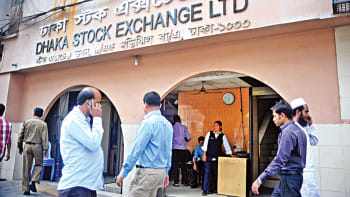The many benefits of diversifying Bangladesh's capital market

Our capital market has been characterised by a narrow range of financial instruments, primarily dominated by equities (stocks) and a small number of debt instruments (e.g. corporate bonds). There is a lack of innovative and diversified investment options such as derivatives, exchange-traded funds (ETFs), green bonds, real estate investment trusts (REITs), futures, and other structured products.
It is recognised that a well-functioning capital market can play a vital role in supporting inclusive economic growth by channelling long-term finance into infrastructure and other large-scale projects that create jobs and improve access to markets. To develop an effective and efficient capital market, it is pivotal to have a wide array of investment opportunities that attract potential small investors. In the long term, sub-components of the stock market have positively affected Malaysia's economic growth (Tan and Shafi, 2020). A fixed-income security like a mutual fund or bond is one such investment, providing an opportunity for regular fixed income as well as capital gains.
A study on the potential of the derivatives market and economic stability of Bangladesh suggests that there are various prospects for derivatives as financial instruments in our capital market (Molla, 2018) for achieving economic stability. Another study on whether financial development holds the key to economic growth in sub-Saharan Africa found a strong positive correlation between economic growth and stock market development (John et al., 2013). This study suggested the adoption of policies that create a favourable environment for financial market development, including efforts to integrate the small capital markets.
Nathaniel et al. (2024) have extended these insights to emerging and developing economies, including the South Asian region. This research has demonstrated that diversified and developed stock markets can significantly contribute to economic growth through various mechanisms. By providing companies with access to capital, they facilitate the mobilisation of domestic savings, which can be invested in productive ventures. The presence of multifarious products in the capital market can incentivise companies, leading to increased efficiency and profitability (Chowdhury and Khan, 2024).
According to Md Edrich Molla and Md Zafar Iqbal (2019), Bangladesh must implement strategies to expand its capital market to finance productive investments and infrastructure projects. Additionally, the Bangladesh Securities and Exchange Commission (BSEC), as the capital market regulator, should take practical steps to ensure good corporate governance, encourage reputable companies to issue bonds and shares, and provide ongoing legal support with more attractive incentives, particularly for foreign investors.
Inadequate financial depth, lack of product diversity, inconsistency in the supporting legal and regulatory framework, and similar issues continue to plague the country's capital market despite the many improvements made over the years (Akter and Rahman, 2023). A sustainable and in-depth capital market is possible when there are adequate financial instruments in the stock market to meet the increasing demand of investors and issuers. It is not possible to address the narrow structure of the capital market without introducing the necessary financial products. Therefore, an effective policy framework is urgently required to address the crisis—why there is insufficient product availability and what is needed to tackle these issues.
Bangladesh's capital market is one of the smallest in Asia. The BSEC plays a pivotal role in fostering a conducive environment for a vibrant, dynamic, and diversified capital market. At present, our capital market is heavily dominated by equities (stocks), with only a limited number of mutual funds and bonds. However, the market still lacks many financial instruments that are prevalent in developed and even neighbouring capital markets, which are crucial for building a sustainable, diversified, and advanced capital market. The limited diversification of financial products has resulted in a disproportionately small capital market in our country, constituting just 13 percent of the economy. Furthermore, the capital market's contribution to GDP remains significantly lower than not only developed economies but also neighbouring South Asian nations.
According to data from the Dhaka Stock Exchange (DSE Monthly Review, December 2024), the total market capitalisation of all listed products stands at just $65,719 million, which is significantly low not only in comparison to developed capital markets but also relative to neighbouring capital markets.
In the absence of sufficient and diversified products in the capital market, an overly large burden of corporate lending is taken on by the banking system, typically with the blessing of a government in pursuit of credit-allocation preferences. In contrast, when the relative sizes of the banking system (money market) and the capital market are more balanced—as would be the case with a well-developed capital market—market forces have a much greater opportunity to assert themselves, thereby reducing systemic risk and the probability of a crisis.
Policy and regulatory measures need to be taken to promote product diversification in our capital market. Steps must be taken to encourage domestic insurers, the pension authority, different government projects, private firms, corporate houses, and foreign institutional investors to design and launch financial products in our capital market. Risk management tools such as Interest Rate Futures, Credit Default Swaps, and Repos should be popularised. A liquid capital market can play a critical role in supporting economic development as it supplements the banking system to meet the requirements of the corporate sector for long-term capital investment and asset creation.
The lack of product diversification in Bangladesh's capital market limits its growth and sustainability, making it challenging for investors to hedge risks. Expanding the range of financial instruments, such as derivatives, ETFs, and asset-backed securities, can enhance market access, liquidity, and capital for both institutional and retail investors. This diversification will foster a more robust and competitive capital market, attracting local and foreign investments and promoting economic growth. A coordinated effort among policymakers, financial institutions, and market participants is required to create a more inclusive and diversified investment environment.
Dr Md Moniruzzaman is professor at the Bangladesh Institute of Governance and Management (BIGM) and former additional secretary to the Bangladesh government. He can be reached at [email protected].
Sanaulla Hasan is public relations officer (assistant director) at the Bangladesh Securities and Exchange Commission (BSEC). He can be reached at [email protected].
Views expressed in this article are the author's own.
Follow The Daily Star Opinion on Facebook for the latest opinions, commentaries and analyses by experts and professionals. To contribute your article or letter to The Daily Star Opinion, see our guidelines for submission.


 For all latest news, follow The Daily Star's Google News channel.
For all latest news, follow The Daily Star's Google News channel. 












Comments